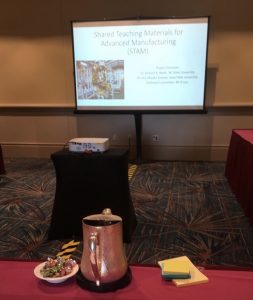STAM Workshop 1
MAY 2019
STAM WORKSHOP #1

Participants:
| Guha Manogharan | PSU | ME |
| Bopaya Bidanda | UPitt | IE |
| Ola Harrysson | NCSU | IE |
| Rohan Shirwaiker | NCSU | IE |
| Paul Cohen | NCSU | IE |
| Binil Starly | NCSU | IE |
| Sam Cynamon | NCSU | |
| Yuan-Shin Lee | NCSU | IE |
| Linkan Bian | MSU | IE |
| Namhun Kim | UNIST (Korea) | ME |
| Darrell R. Wallace | YSU | IE |
| Chuck Zhang | GA Tech | ISE |
| Gul Kremer | ISU | IME |
| Pat Wysk | Assistant | |
| Rick Wysk | NCSU | ISE |
| Okenwa Okoli | FSU | ISE |
| Rebecca Leitzell | BHS | Edu |
Presentation:
Notes:
- Reduce student cost for course material for students (Rick Wysk)
Current hard copy costs for manufacturing processes texts are between $200 – $300, which immediately creates an issue for students in these classes. Most texts are very long so that they can be “inclusive with most processes and course components”. Unfortunately, most of the text book is not assigned for reading during the course.
A Repository of editable text chapters will enable instructors to utilize only those chapter/topic components that will be investigated during the course. The chapter materials can be modified especially for a course offered at a university or college. This allows for: 1) Customization for each specific course to fit regional industry specifics and course objectives/outcomes, 2) the integration of laboratory materials, where appropriate, 3) the elimination of the many unused chapters included in a hard copy text, 4) the availability of focused Questions and Problems to meet specific course needs, 5) the evolution of quizzes and tests to better fit course needs, and 6) the inclusion of specific figures and tables to better fit the course outcomes (machines used in the lab, products used to illustrate specific concepts, etc.).
- The flexibility of organization (Rick Wysk)
Again because, “A Repository of editable text chapters will enable instructors to utilize only those chapter/topic components that will be investigated during the course”, the design of each course can be customized. This allows for the creation of different courses that concentrate and provide in-depth coverage on different manufacturing topics and processes, while also providing a broad background for other topics. It also provides for the addition of new an evolving topics/processes into existing chapters. Researchers/experts in evolving areas can utilize some of their research materials for inclusion in existing chapters.